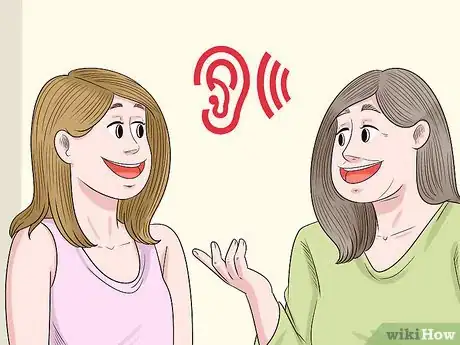This article was co-authored by Trudi Griffin, LPC, MS. Trudi Griffin is a Licensed Professional Counselor in Wisconsin specializing in Addictions and Mental Health. She provides therapy to people who struggle with addictions, mental health, and trauma in community health settings and private practice. She received her MS in Clinical Mental Health Counseling from Marquette University in 2011.
There are 11 references cited in this article, which can be found at the bottom of the page.
This article has been viewed 34,066 times.
A fulfilling life can be elusive, as there aren’t any concrete factors that truly determine whether or not a person has truly found happiness. There are, however, elements of your life that you can focus on in order to improve your chances of finding long lasting satisfaction. By improving your relationships with others, finding work that leaves you feeling fulfilled and making peace with yourself, you will be well on your way to making your life worth living.
Steps
Improving Your Interpersonal Relationships
-
1Focus on listening to what your friends and family have to say. An important element of strengthening your relationships with friends and family is to establish your ability to listen to what they have to say. Active listening demonstrates the value you place on what people are saying as well as your understanding of the concept they are trying to convey.
- Listen careful to what people have to say to you and repeat parts of it back in your own words to demonstrate your understanding.
- Demonstrating how much you care about what people have to say will strengthen the relationships you have together.
-
2Strive to be a good friend. Strong friendships can make you happier and even increase your lifespan.[1] In order to strengthen the friendships that you have, make a point to try to be the type of friend you would like to have.
- Don’t set too many rules or establish too many expectations for your friendships; instead let them progress organically and without pressure.
- Take your friends feelings into account when making decisions that affect them and let them know that you think about them.
Advertisement -
3Do away with poisonous relationships. While friendship can have valuable benefits in regard to health and mental well-being, the wrong kinds of relationships can have a negative effect on your ability to enjoy your life.[2]
- Phase out people who introduce stress or negative feelings out of your life and choose to associate with those who have a positive effect on your emotions instead.
- Learn how to recognize an abusive relationship and end it safely.
- Focus on cultivating relationships with people that make you feel good about yourself instead of those that make you feel bad.
-
4Don’t compete with those you are close to. It can be difficult to be happy for others if you feel as though you are in competition with them in some way. Allow yourself to celebrate the successes and achievements of your friends and family.[3]
- The successes of your friends are important and worthy of celebrating.
- Admire the talents of your friends openly. It will strengthen your relationships and they may reciprocate by pointing out your own strengths that you may not have been aware of.
-
5Accept others for their differences. Your friends may not find the same things in their lives to be important as you do. This does not have to create distance between you; instead try to appreciate the different perspectives you can gain through your friends with differing viewpoints.[4]
- Avoid making generalizations about people and instead try to get to know them. You may find those with little in common with you have much to offer in terms of friendship.
- Try not to judge your friends over the things they feel differently about than you. Instead, listen to their view points as a way to expand your own horizons.
Finding Fulfilling Work
-
1Don’t simply chase money. Money makes the world go around, there’s no denying it, but studies show that making more money does not necessarily translate to being happier. Instead of chasing the best possible paycheck, consider what things truly matter to you.[5]
- It is more important that you find value in what you do than it is that you make a lot of money in terms of happiness over time.
- Making too little money can also negatively affect happiness however, so it is important that you still find gainful employment.
-
2Pursue your dreams or passions. While it is important that you find and retain gainful employment in order to maintain long term happiness, finding a job that aligns with your personal passions can help ensure you feel more fulfilled and content.[6]
- People who work within an industry in which they feel passionate about regularly report higher levels of life satisfaction.
- Look for work that relates to what matters to you: if you enjoy teaching consider a career in education. If you love cars perhaps being a mechanic would be fulfilling.
-
3Work to be productive. An important element to finding a fulfilling career is to find a job that leaves you with a feeling of satisfaction. When you find the right job and get into a groove, you can work in a way that provides you with a regular sense of accomplishment.[7]
- Finding your “flow” or getting in “the zone” are common terms used to describe finding a job you are in sync with and can accomplish quite a bit in a short amount of time.
- Feeling as though you accomplished something of value will help you see your job, and in turn that aspect of your life, in high esteem.
-
4Find a job that offers some level of freedom. Having control over your life is important to feeling happy and fulfilled. Of course, the nature of employment often limits the amount of independence and freedom one can enjoy on a day to day basis. It’s important to find a line of work that offers the amount of freedom you feel is necessary and appropriate.[8]
- Autonomy at work can provide you with an increased sense of ownership of your work and in turn, an increased sense of accomplishment when you perform well.
- Having the freedom to choose how you execute your day can often lead to increased levels of workplace satisfaction.
-
5Consider changing careers if you are in the wrong field. If your current position can’t help you find fulfillment in life, you may want to consider making a career change. Finding a new job, especially one in a new line of work can be daunting, so do some research before making a change.
- Do some deep thinking, then do some research to help you Find Your Dream Career field.
- Once you have chosen a career, you’ll have to start the process to Switch Careers.
Making Peace with Yourself
-
1Stop dwelling on your failures. Everyone has made mistakes, and it’s important to value the lessons you learn through them, but don’t allow yourself to dwell on them to the point where it affects your ability to be happy.[9]
- Obsessing over past failures can’t change what happened, it can only change how you feel today.
- Try to identify the lessons that you have learned from your mistakes. For example, if you failed a course in your first semester of college, you might have used the experience to help you pass the class the second time around and to improve your study habits overall.
-
2Don’t focus on gaining the approval of others. You should decide on the type of person you want to be, and only your opinion ultimately matters when it comes to how successful you are at becoming that person. The fear of being judged can create significant stress in your life and steal your focus away from things that really matter.[10]
- The opinions of others carry only as much weight as you allow them to. Don’t let what others think about you affect how you see yourself. For example, if someone criticizes you for often being disorganized, then you might focus on how important being organized is to you. If you think it is important, then you could make an effort to become more organized.
- It’s alright to consider the perception of others, but remember that you are only responsible to yourself for your successes and failures.
-
3Be charitable. Being charitable does not have to mean giving money to a charity, though if you find that rewarding there’s nothing wrong with doing so. You can also be charitable with your time, your attention or your skills. Find a way to give back to the world around you and you will find yourself feeling much more fulfilled.[11]
- Find a cause you are passionate about and donate to it, volunteer your time, or offer your support in some way.
- Giving back to the community offers the opportunity to feel better about yourself while helping others that need it.
-
4Celebrate your strengths and nurture your weaknesses. It can be easy to lose sight of the things you excel at over time. Eventually, they just become normal parts of your day, but remember that your strengths are a big part of what makes you great. Weaknesses, on the other hand, are not indications of where you’ve gone wrong, but rather where you can still work to improve.[12]
- Don’t be too hard on yourself when you don’t take to something quickly. Nurture your weaknesses and value them as an opportunity to improve and develop as a person.
- Make a list of five of your strengths and two of your weaknesses. Then use the list to help you find ways to use your strengths to work on your weaknesses.[13] For example, if one of your strengths is that you are good at drawing, but a weakness is that you are shy, then you might try to use your art as a way to connect with people, such as by joining an art club or drawing something special for someone.
-
5Forgive yourself and others. Forgiving can be among the hardest things to master, as often it’s the things that hurt the most that are most in need of forgiveness. Be ready and willing to forgive others for their mistakes, but place just as much emphasis on forgiving yourself for where you’ve gone wrong.[14]
- Try writing a letter to yourself or to the person who you want to forgive (but don't send it). In the letter, describe what happened and why you want to forgive yourself or someone else for it. After you finish the letter, you can rip it up and throw it away.
- Keep in mind that forgiving someone is not as much about the other person as it is about you. The other person does not even need to apologize for you to forgive him or her.[15] By forgiving someone, you are making a conscious decision to let go of the anger that you feel and move forward.
-
6Get help if you need it. If you find yourself feeling as though you don't want to keep living, or you're looking for ways to make life worth living because you fear you may hurt yourself, you should seek help. Remember, life is always worth living and there are people out there that can help.[16]
- You can learn how to cope with thoughts about suicide.
- You should do whatever you can to stop yourself from going through with suicide.
- If you aren't comfortable reaching out over the phone, you can even get help online.
References
- ↑ http://www.helpguide.org/articles/relationships/how-to-make-friends.htm
- ↑ http://www.lifehack.org/articles/communication/10-steps-improve-your-personal-relationships.html
- ↑ http://www.mayoclinic.org/healthy-lifestyle/adult-health/in-depth/friendships/art-20044860?pg=2
- ↑ http://www.mayoclinic.org/healthy-lifestyle/adult-health/in-depth/friendships/art-20044860?pg=2
- ↑ https://www.gsb.stanford.edu/insights/research-can-money-buy-happiness
- ↑ http://theweek.com/articles/444815/how-find-fulfilling-work-according-science
- ↑ http://theweek.com/articles/444815/how-find-fulfilling-work-according-science
- ↑ http://theweek.com/articles/444815/how-find-fulfilling-work-according-science
- ↑ http://www.forbes.com/sites/susantardanico/2012/09/27/five-ways-to-make-peace-with-failure/#207f751b376c
- ↑ http://www.forbes.com/sites/susantardanico/2012/09/27/five-ways-to-make-peace-with-failure/#207f751b376c
- ↑ http://psychcentral.com/lib/therapists-spill-12-ways-to-accept-yourself/
- ↑ http://psychcentral.com/lib/therapists-spill-12-ways-to-accept-yourself/
- ↑ https://www.psychologytoday.com/blog/in-practice/201506/how-use-your-strengths-overcome-your-weaknesses
- ↑ http://psychcentral.com/lib/therapists-spill-12-ways-to-accept-yourself/
- ↑ https://www.psychologytoday.com/blog/do-the-right-thing/201403/7-rules-forgiveness
- ↑ http://www.suicidepreventionlifeline.org/












































































